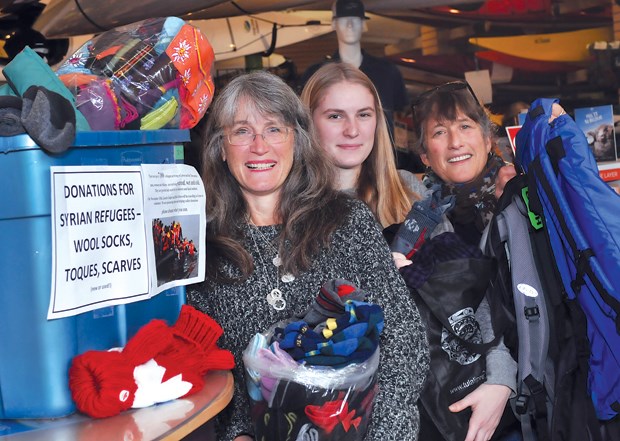This week, a group of four North Vancouver women will land on a Greek island in the Aegean Sea that has become the epicentre for the Syrian refugee crisis.
Lesvos is normally a tourist destination, but the local women aren’t going for a holiday. In recent months Lesvos has been swamped with wave after wave of desperate refugees. They arrive in large rubber boats captained by smugglers, wet and cold on the shore of the island that has few resources to cope with their numbers.
Laurie Cooper, who heads to Lesvos on Sunday, compared the population there to the District of North Vancouver. “What would it be like if we had 2,000 to 3,000 refugees landing on Cates Park beach every day? How would we cope?” she said.
The North Vancouver women were inspired to take action after seeing the photograph of Alan Kurdi’s body on the beach of another Greek island – the young refugee boy who drowned on one of the dangerous crossings.
The women met and decided they needed to do something – thinking at first of organizing a fundraiser or trying to sponsor a refugee family. But when Cooper began contacting the small aid groups most active on Lesvos to find out what was needed, she was told, “We need volunteers. We need people here to help us.”
The four North Vancouver women – Cooper, Ellen Fulton, Erian Baxter and Baxter’s 19-year-old daughter Hannah Dubois – will arrive on the island to do just that, starting on Monday.
They’ll be taking $6,000 they’ve raised to buy sleeping bags, blankets and food for the refugees. Each of the women will also carry two large duffle bags which they’ll stuff with warm wool socks and hats plus 500 emergency blankets donated by Mount Seymour.
Cooper acknowledges they don’t know exactly what they’ll find when they arrive on the island.
About 600,000 refugees have landed on the Greek Islands since the beginning of the year, including about 125,000 who landed on Lesvos in October alone, despite the onset of winter. Refugees – including small children – have also continued to die trying to make the crossing, as boats are swamped in increasingly rough weather.
“Normally the traffickers wouldn’t be transporting anybody now,” said Cooper, but there are still boats arriving daily.
When the refugees arrive on the northern beaches, they’re usually given dry clothes and shoes, if available. They then make their way to a “transit camp” 15 minutes away. From there, they are bussed another hour to one of two “registration camps,” where their refugee claims are processed.
Conditions in the non-Syrian refugee camp – mostly people from Afghanistan and Iraq – are worse, from what she’s been able to learn, said Cooper. There are few bathrooms and not enough food.
Circumstances in the Syrian camp aren’t much better, she said, particularly as winter rains have set in. “There isn’t enough shelter,” said Cooper. “People are just lying on the ground in the rain with garbage bags on top of them.”
About 40 per cent of those who arrive on Lesvos are children under 18. “Often there’s women travelling alone with their kids,” said Cooper. About 10,000 children have also arrived alone on the island.
While the UN’s High Commission on Refugees is present on the island, many of the larger aid agencies have a smaller presence on Lesvos than might be expected. That’s because “it’s not a natural disaster. It’s not even a war,” said Cooper. “The Greek government is responsible for taking care of these people.” But that government is itself in the midst of a protracted economic crisis and has few resources to offer an overwhelmed Lesvos.
Cooper said that’s where smaller ad-hoc organizations of volunteers have been stepping up, like the Starfish Foundation, which the North Vancouver women will volunteer with.
Baxter said she’s well aware that in many crisis situations “you’d do more harm than good if you showed up.” But in the absence of large co-ordinated efforts by others, Baxter said she hopes she can do some good.
The women acknowledge they don’t know what they’ll see and experience when they get to Lesvos. They received practical advice from other volunteers who recently returned to the Lower Mainland after volunteering on the island about everything from what kind of neoprene boots to wear on the beach to how to stay mentally healthy. “They purposely didn’t put themselves in any situations where they’d be exposed to things they didn’t think they could handle,” said Cooper.
She adds there’s still a need for plenty of “grunt work” away from the front lines of the tragedies – sorting donations, handing out clothes, making food, cleaning up the beaches.
“I don’t think you can ever really be prepared for tragedy,” said Cooper. “I think I have to focus on the help that I can offer and just do that, day after day.”
“I think it is pretty overwhelming, some of it,” said Baxter. “I think there are ways to be careful with what we’re helping with.”
For the Syrian refugees, Lesvos is merely one stop in the harrowing journey to a better life. After they have been processed as official refugees, most will buy passage to Athens and join the human wave walking north into Europe, hoping to make it to a country like Germany or Sweden.
“This is just the tricky, dangerous part,” said Baxter. “Then they’ve got the long-term difficult part.”
Her hope is to “greet them in between” and offer a small bit of practical comfort.a
To follow the women’s experience in Lesvos go to canadacaring.ca. To donate: gofundme.com/canadacares.



